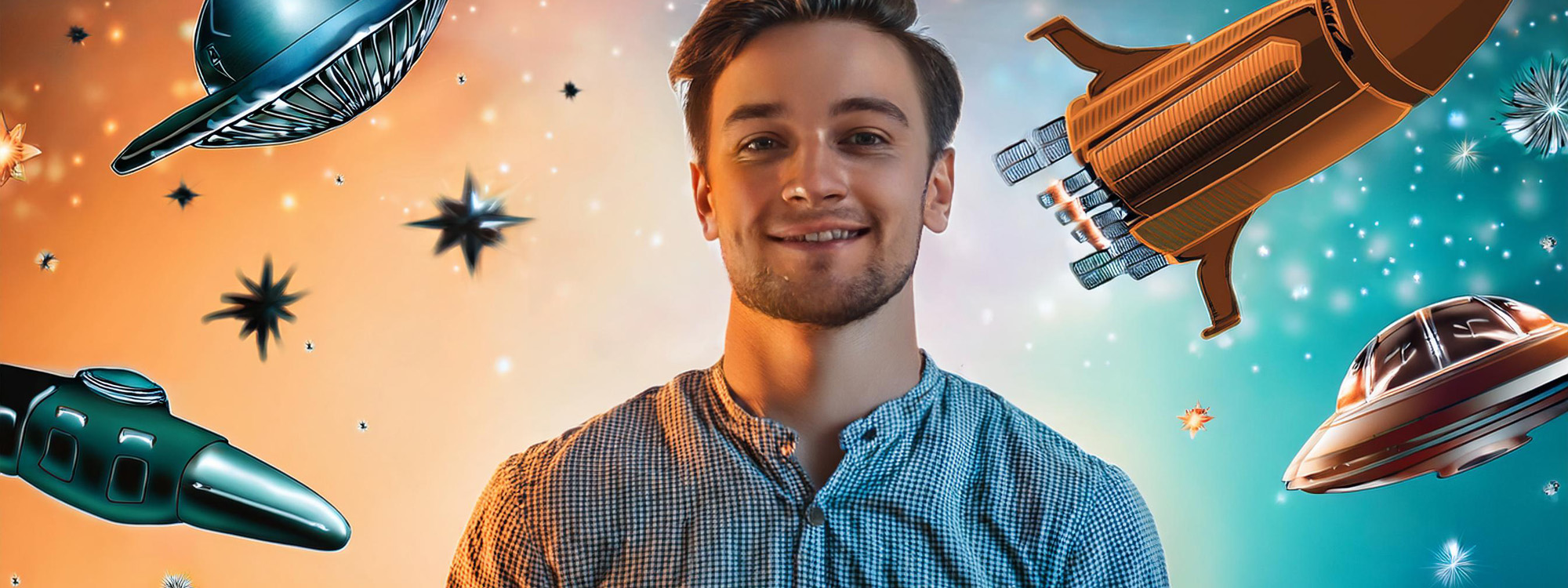| |
You can learn a lot about me from Star Trek. It's shaped my perception of myself and my pedophilia. It's time I came out of the closet about something.
I... am a nerd.
Yes, that's right, I am part of that discriminated-against minority. I love math and science, I enjoy puzzles, and yes, I enjoy science fiction—including, especially, Star Trek. I'm not just a nerd; I'm a Trekkie.
Ahem, pardon my fun there. Although there actually was a time in my early teens where I think I saw being a nerd as a bigger obstacle in life than being a pedophile! (It was when I was still understanding just what my attractions were.) In truth, both identities have affected me deeply, and they've intersected in interesting ways.
For example, Star Trek really shaped my morality growing up. I love its aspirations. I love how it paints a picture of a humanity that can get better, even if that journey takes time, and even if we take some steps backwards before taking steps forwards. I love the constant struggle to tell right from wrong, to understand what justice is, to learn how to build a society. I love the characters; it's filled with outsiders who tell me something about myself.
You can learn a lot about me from Star Trek. Since this blog is, after all, meant to share my own story, and to talk about morality, what better way to accomplish its mission than to talk about these shows, and to show how they impacted my perception of myself and my pedophilia?
Don't worry. Even if you're not a Star Trek fan, this will be a friendly (and interesting!) post for you. Let's go ahead and talk about the Star Trek of the '80s and '90s.
musing one: on star trek and Improvement
One of the premises of Star Trek is that several hundred years in the future technology has largely addressed human needs. Food and housing are plentiful, and (depending on the show), humans don't even use money anymore. Instead, people strive better themselves and that drives a lot of their choices. As someone who has always striven to improve myself, and who's also always wanted to contribute to society, this really resonated!
The core point of Star Trek is that in the future, humanity has improved itself by building a better society. Yes, it says, things might be bad now, but by working together and unifying we can make them better. The way people talk about the world now, it seems wildly optimistic—and yet, by almost any metric, we are already seeing humanity improving itself. Broadly speaking, the trend for statistics across the world has been for improvements in child poverty, hunger, life expectancy, education level, and the percentage of people living in relative freedom. (Look it up!)
Improving, of course, does not mean that we're anywhere close to the _Star Trek_ world. The world has a lot of suffering and injustice. Nonetheless, on a global scale things seem to be getting better. (You do have blips, and the past decade does indeed have mixed signals, but the overall trend remains strong.) There are so many things that could be better, but humanity compared to centuries ago, or even decades ago, is so much better than it was. So yes, I believe and hope society can move to a point more like Star Trek.
In a wildly overused quote, Dr. Martin Luther King Jr. said, "We shall overcome because the arc of the moral universe is long, but it bends toward justice." (I'll also note that there are even some arguments that this quote is misinterpreted from Dr. King's purpose.) I don't believe that arc is preordained, but I believe it is possible. Dr. King believed that too. It's always a pretty great piece of Star Trek lore that MLK was a fan, and in fact encouraged Nichelle Nichols to stay in the role of Lt. Uhura, a Black woman in a leadership role on the bridge of the Enterprise. (Read that link; it's pretty remarkable.)
I believe things can get better. And yes, that resonates on a personal level too: I believe we can get to a point of greater understanding, where perhaps society improves, and perhaps society recognizes my attraction without demonizing it. Although obviously never addressed in Star Trek, I believe it's a world where I would be treated with respect.
musing two: on star trek and outsiders
A favorite character among many fans is Lt. Commander Data from Star Trek: The Next Generation. He's an android, fundamentally an outsider and observer of humanity. Despite being unable to experience human emotions for much of his arc, he still seems lonely; he's essentially the only being of his kind. Above all, he wants to become more human.
I too often feel like I am observing humanity from the outside, and certainly I felt that for much of my life. Not having sex (because I don't want to harm anyone, and don't enjoy adult sex very much) means that so much of human experience is different for me. Especially in high school, I looked at everyone shifting their lives to try to have relationships and I just... didn't. Why would I? I couldn't have a meaningful sexual relationship. I've never been in love. So, like Data, I watched my peers from the outside, wondering about their internal lives and what it felt like to be in love.
In a rather bizarre plot line, Data did actually have sex at one point. I always wondered what that felt like for him. He couldn't feel emotion, not even pleasure. (When I had sex with an adult woman for the first time, that was effectively my experience as well!) Somehow, though, the experience became quite meaningful to him. I always tried to understand how that could be.
For a long time, I was the only pedophile I knew, and had few or no connections with others like me. (Nor did I want them, since I didn't know of other non-offending pedophiles.) Loneliness is a core experience of being a pedophile. Yet Data eventually overcomes his loneliness through a kind of friendship. His experience of friendship might be different from ours: "As I experience certain sensory input patterns, my mental pathways become accustomed to them. The inputs eventually are anticipated and even missed when absent." If he couldn't feel some human emotions, he found another way to have a similar experience.
Data addresses his isolation in part by throwing himself into his work. That, too, is something I've done. Although (like Data) I have a lot of friends, family felt unlikely and so I asked myself how I could contribute and how I could find meaning in life. My meaning now comes from giving back, contributing through work, and improving myself. All things Data strives for, and all things I strive for.
(Don't worry, I don't model myself on an android! I am describing these as places of similarity and empathy I've found, not as any kind of conscious role model experience.)
There is even a famous episode where Data is put on trial, asking if he is truly a sentient being, since after all, a man constructed him. It goes beyond this one episode; Data constantly has his humanity and his rights questioned by others. Nonetheless, he always deals with it with aplomb. I wonder what would happen if I were put on trial and judged. Data was eventually ruled to be a life form and not merely a possession. Would society decide that I am fully human?
musing three: on morality
A famous scene in Star Trek has a beloved character sacrificing himself to save the ship. "The needs of the many," he says, "outweigh the needs of the few, or the one." (To be pedantic, that quote is not said by one person, but a second person finishes it for the first.) In some sense, that movie, and movies after it, grapple with that very question: to what extent should one person sacrifice themselves for others?
I have desires. I don't act on them because that would be putting my needs, or desires, above those of others. This core idea, of living your life so as to contribute to the overall goodness of the world, is really important to me. (In the real world, in my life, I seek a balance: of course I do many things for my own happiness, just as I try to live in a way that supports the happiness of others.)
Star Trek is filled with these kinds of moral questions and considerations. The holdings of tolerance within the Federation are constantly tested as they come into contact with new societies that are different from their own, and the crew must decide between letting these societies continue on their course or interfering to make them better according to human norms. They encounter races that are different in thought, in sexuality, in gender, in legal viewpoints, and so forth, and the Federation must adapt to meet these cultures where they are. Central to the show are these questions: how you can be yourself, let others be themselves, and still act according to your morals? These are big questions, and they're important to me, because moral choice is a big part of my life experience.
Science fiction is such a good way to play this out. By creating a world that is so different from our own, you can abstract to the core issues you want to consider. There's a reason this show has shaped me so much.
musing four: on open-mindedness
In the '90s, one of the highlights of Star Trek was its open-mindedness towards different cultures and ways of thinking. As I mentioned above, a constant dilemma was meeting new cultures that had practices the Federation found strange, but it wasn't just that sometimes their practices were strange. Sometimes, their practices felt morally wrong. The Federation was committed to allowing individual cultures to develop on their own, so inevitably there was conflict. There were lots of interesting and really substantive discussions about how to respect people and cultures while also maintaining your own moral outlook.
It's one thing to be tolerant of people who are doing nothing objectionable to you, even if they're different; it's another thing entirely to be tolerant of people you disagree with or fear. Star Trek genuinely wrestled with those kinds of issues. This is, of course, especially important to me: I am one of those people whom others might disagree with, or whom they might fear.
(As an aside, I once wrote to a journalist about my pedophilia, asking him to be cautious in how he refers to pedophiles. He responded extremely well, citing this Scott Alexander essay, which I really appreciated. The first section, in particular, is quite relevant. Although I'd read the essay before, it meant something to me that this journalist was driven by the essay to be more tolerant.)
musing five: on role models
On a final and more personal note, Star Trek provided role models for me, especially the captain from Star Trek: The Next Generation. Captain Picard was unmarried and had no children. He was dedicated to his work; successful; respected. I never thought about this consciously, but there isn't a lot of representation of successful men who don't have a clear sexual outlet. Captain Picard was such a man.
I wonder if seeing him made it easier for me to imagine a successful life course for myself. Even as I've grown older, and I've realized that I can find nonsexual life partnership with adults that fills at least some needs, that vision of how to live one's life remains deeply important to me.
some conclusions
I wonder if we'll ever get to a world that is as tolerant as Star Trek's world is. I hope so, and I do believe we can continue to improve.
I wonder if that world will be tolerant of my pedophilia. I wonder if Star Trek itself might ever choose to address that question. (Not likely, given both how the world perceives pedophilia and Star Trek's seeming turn towards moral safety, but maybe we'll get there sometime.)
But mostly, I think about those core ideas. Of self-improvement. Tolerance. Striving, and being vigilant, to make society better. I'm proud to have been shaped by this particular artifact of pop culture; there's a reason that it means so much to me.
Star Trek helped shape my views. It helped me to really think about where each person is coming from; to celebrate individuality; to value different perspectives; and to seek to grow and to help others grow. It pushes me to seek alignment with others while still holding my ground over what I believe. I hope you can see all of these threads underlying how I approach questions on this blog.
About the author: After realizing my attraction at the age of 13, I began the journey of figuring out how to live a good life. When I eventually landed happily, I decided to share that journey with others. At first, I primarily wrote answers on Quora, which were viewed over a million times, liked thousands of times and led to numerous positive comments and discussions. I also started a blog, which was fortunate as a likely reporting campaign resulted in my Quora account being deleted, so much of my work remains online there. In addition to his writing (here and elsewhere), I enjoy board games, hiking, and spending time with friends. I have been part of the community for over a decade, seeking to do my part to make the world a better place.
You can find the original article, along with reader comments (and the opportunity to leave your own) at Leonard's blog. | |






 interview: kira, australian pedophile
interview: kira, australian pedophile door slammed in face
door slammed in face review of "pedal" by chelsea rooney
review of "pedal" by chelsea rooney